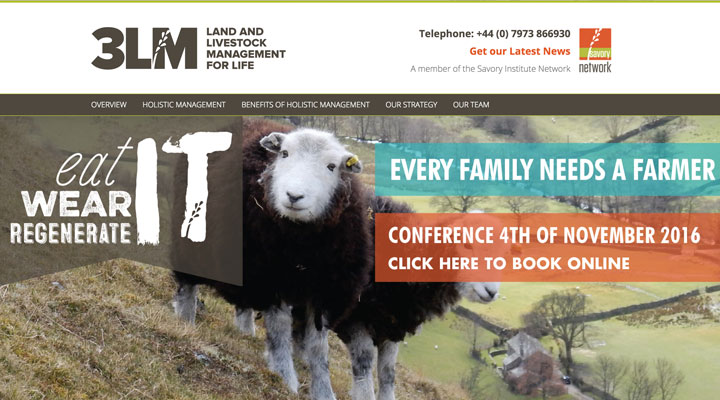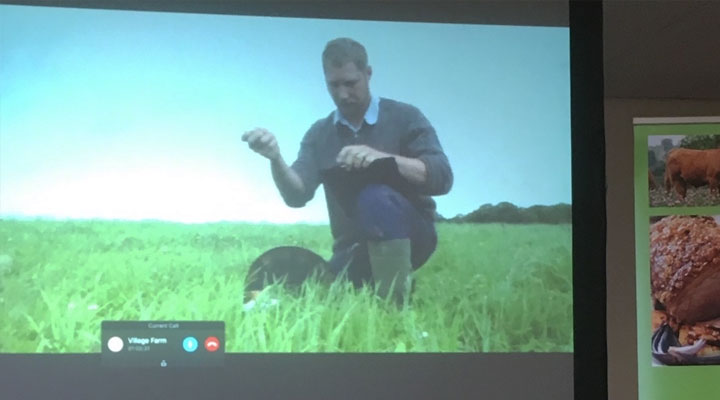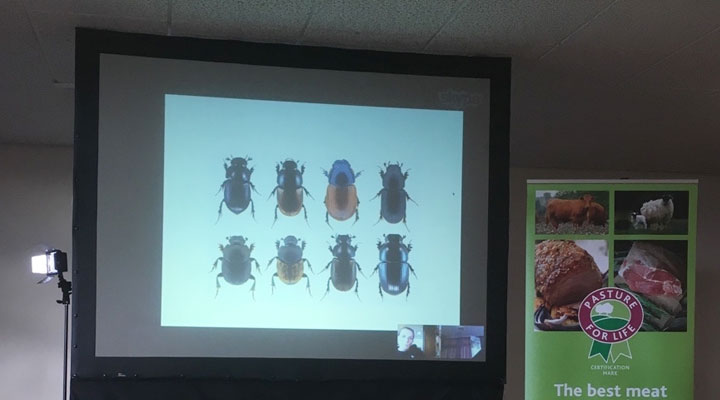UK Savory Institute Network Conference

Sheila and Christopher Cooke and Marianne Hill run 3LM and lead the Savory Institute Hub in the UK. They are promoting and training farmers and land-owners to take a whole systems approach to land regeneration using a process known as Holistic Management.
This is a way of decision-making and planning that gives people insights and management tools so they can work with nature, resulting in more informed decisions that hopefully balance economic, social and environmental considerations.
In the context of the ecological restoration of grasslands, managers implement Holistic Planned Grazing to properly manage livestock, mimicking the predator/prey relationships in which these environments evolved.
Many Pasture-Fed Livestock Association members probably follow many of the Holistic Management principles in their own way – by mob grazing, growing herbal leys, and all the other things they do to improve their soil health.
So it was no surprise that many of the conference speakers and those in the audience were PFLA members!
Graham Harvey
Journalist and Archers writer Graham Harvey kicked off the day by saying the world, which is now in the ‘post-facts’ era, belongs to storytellers. This can only be a good thing for PFLA members because we have such great stories to tell to the public.
He traced the origins of food and eating from hunter-gatherers and nomads up to the 13th century, when grassland built the wealth of Britain through the wool trade.
Between 1750 and 1940, the English countryside remained based on pastoral, mixed farming. Real food was produced locally in a sustainable way, year after year after year.
But post war – this system of farming was hijacked by oil-based technologies, which produce the largely non-real foods stacked high in supermarkets today.
Mobile parlours which allowed farmers to milk cows out in the field, were the saviour for many dairy producers after the depression of the 1920’s. But then the Milk Marketing Board arrived, whose guaranteed pricing took away the need for farmers to innovate, and Express Dairies, who persuaded the government that all milk should be pasteurised, and that they should be the ones to do this.
In answer to the feeling that the public will always buy the cheapest, Graham is convinced there are growing numbers who actually now want real food and are prepared to pay a bit more for it.
Tim May
Graham produces some excellent films for his online Pasture Promise TV. He showed the audience one of his latest – featuring the journey Hampshire arable farmer Tim May has taken, introducing cattle and sheep onto half of his large arable estate in Hampshire.
Continued intensive, agrochemical based farming had seriously eroded Tim’s soil reserves. When he took a digger in 2013 and dug a very large hole to look at the structure and make-up of the soils, he and soil agronomist Mike Harrington found a very depressing site. A close and compacted top layer, short and shriveled roots, with little organic matter or indeed any life.

Three years later, a similar hole dug under the species-rich grass ley, revealed a very different picture. There was a large dark area in the top levels which was organic matter, four times the number of worms and plant roots travelling down to 1.5 metres or more. Biology has returned to the soil, simply by introducing sheep and mob grazing them on bio-diverse pastures, which are now an intrinsic and important part of the arable rotation.
As well as encouraging life below ground, wildlife has boomed above ground too – with 55 species of birds counted including 14 out of 19 on the endangered list.
“This is allowing us to run a business that is supporting the environment while allowing animals to be animals,” said Tim. “The cows and sheep move as a herd or flock grazing the sward behind electric fences, then allowing it to rest for three months. This creates a much better food source for the animals and for the soil. I am now a nurturer of nature and the fun has come back into farming!”
Rebecca Hosking
At Village Farm, a 71-hectare coastal enterprise at the southern most tip of Devon, Rebecca Hosking has also seen a remarkable influx of wildlife in the short three years she has been in charge of this previously conventionally managed farm.
Horrified by the 60% crash in wildlife numbers since the 1950’s, Rebecca has taken all the fossil-fuelled power away from the farm and is producing in an ecological way. Every field is its own ecosystem and has been planted with 90 species of herbal leys and wildflowers. Thousands of trees, including fruit trees have been planted and more are going in this winter. Biodiversity engineers – sheep, pigs and goats are now bringing life back onto the farm.
One thousand coloured wool sheep cross-bred to exist in the harsh winter conditions, live with nature as one. They are mob-grazed, with electric fences referred to as bears and wolves, to reflect the predators of bygone ages that would have pushed flocks to keep on moving to pastures new.
The sheep exert natural behaviours and any movement from this alerts Rebecca to something being wrong. There are born leaders, followers and back runners. ‘Bungle’ is always the last ewe to move through to fresh pasture, if she is not – then something is wrong with the ones coming after her and they need attention.

The long rest period before the sheep come to graze again means there are no pathogenic worms left alive to infect ewes and lambs – so no wormers are used, or insecticide sprays. So insects thrive on the pastures, including eight different types of dung beetle. These include winter species, which provide feed for Little Owls, which have made a come back to the farm.
Predators, while not being welcomed, are not chased away as this would create ecological gaps. Foxes only take weak lambs from rubbish mothers, and take a decision away that Rebecca might have to take three to four months later.
Despite the return of thousands of birds and mammals and insects, Rebecca is adamant that Village Farm remains a profitable farm and is not a nature reserve.
Lamb meat boxes are sold online and the meat is sold to chefs and restaurants and at local food festivals. The organic coloured wool is sold to a local spinner and for knitted baby clothes. Also to a local business making eco-felted shrouds for burials. It really is all about the cycle of life.
Other speakers
The conference was packed full of other interesting speakers including Caroline Grinwood, a self-confessed foodie and human nutrition enthusiast, who knows a great deal about the paleo and primal diets.
Caroline praised 100% grass-fed meat, particularly when eaten after long, gentle cooking, as this is then more easily digested. She also commented on its high levels of omega-3s and their ideal relationship with omega-6s and the presence of Conjugated Linoleic Acid (CLA) in 100% grass-fed meat and dairy. This is hugely anti-inflammatory and can block nasty diseases like cancer.
“I am in awe of how natural food is packaged up to supply all the nutrients a human needs to be healthy,” said Caroline.” If you eat all the bits of a 100% grass-fed animal, not just the lean meats, everything balances out.”
As well as the food that animals provide, Chris Tattersall, managing director of the Wool Room explained how wool is the ideal material for installing healthy, natural sleep patterns. In 2015, his company launched the first complete range of chemical-free pocket sprung mattresses, by harnessing the natural flame retardant properties of wool.
British wool is also used to make mattresses, toppers and duvets – which are naturally cooling in summer and snuggly in winter. Demand for this type of bedding is increasing and if the Wool Room can take just 5% of the market, it could use all the wool British farmers could supply!
Final words from Allan Savory
At the end of the day, delegates tuned in to a video of 81year-old Allan Savory make, what he called one of his most important talks of his life.
He wondered how humans have used technology to explore space and put a man on the moon, but cannot keep planet earth healthy and feed everyone.
Why, has nothing changed he questioned? He feels that institutions reflect the will of society and until the people demand change, nothing will change.
So this requires a consumer revolution – the conference hashtag was #consumerrevolution – before government policy can change.
He feels that the world is looking to technology for the answers to its great problems. But the biological problem of degraded soils that cannot produce food any more and the effects of climate change, require holistic management, not more technology.
More importantly a holistic context is needed – a clear statement of how people want their lives to be, followed by the setting of objectives and ways to tackle the problems without conflict.
The public needs a greater understanding of the role of livestock and how holistic management solves some of the world’s most urgent worries.
Allan told the people watching across the world, that it is up to them to shift societies’ view on management and livestock. Team Humanity has one last chance – he said – but it had better get moving fast!
The conference in Penrith was filmed, so visit www.3lm.network to see all the speakers and find out much more about the Savory Institute Hub in the UK.



